

Life was but a stage for Japan's troubled genius. Though he is most famous as a novelist, Yukio Mishima was also a prolific dramatist.
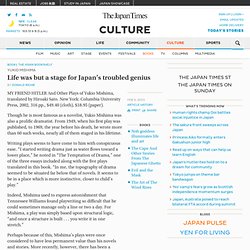
From 1949, when his first play was published, to 1969, the year before his death, he wrote more than 60 such works, nearly all of them staged in his lifetime. Writing plays seems to have come to him with conspicuous ease. “I started writing drama just as water flows toward a lower place,” he noted in “The Temptation of Drama,” one of the three essays included along with the five plays translated in this book. “In me, the topography of drama seemed to be situated far below that of novels. It seems to be in a place which is more instinctive, closer to child’s play.” Indeed, Mishima used to express astonishment that Tennessee Williams found playwriting so difficult that he could sometimes manage only a line or two a day. 黒蜥蜴 Kuro Tokage [Black Lizard] (1968) [Sub En] Black Lizard (1968) Part 1 of 9. Eros und Thanatos - Sex und Tod im japanischen Kino. Von ARTE-Gastautor Dr.
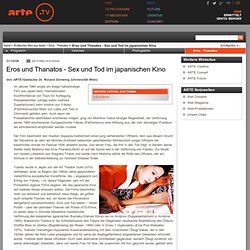
Roland Domenig (Universität Wien) Im Jänner 1966 sorgte ein knapp halbstündiger Film aus Japan beim Internationalen Kurzfilmfestival von Tours für Aufregung. Presseberichten zufolge sollen mehrere Zuseher(innen) beim Anblick von Yûkoku (Patriotismus/Die Riten von Liebe und Tod) in Ohnmacht gefallen sein. Auch wenn die Presseberichte übertrieben erscheinen mögen, ging von Mishima Yukios einziger Regiearbeit, der Verfilmung seiner 1960 erschienenen Kurzgeschichte Yûkoku (Patriotismus) eine Wirkung aus, die vom damaligen Publikum als schockierend empfunden werden musste.
Der Film beschreibt den rituellen Seppuku-Selbstmord eines jung verheirateten Offiziers, dem aus diesem Grund die Teilnahme an dem als Niniroku-Aufstand bekannten gescheiterten Militärputsch junger Offiziere der kaiserlichen Armee im Februar 1936 verwehrt wurde, und seiner Frau, die ihm in den Tod folgt. Dr. The temple of the golden pavilion. Patriotism, Yukio Mishima. Mishima Yukio Haiku. ‘The Temple of the Golden Pavilion’ at the Rose Theater. For a three-hour-long production, “The Temple of the Golden Pavilion” sure does use a lot of shorthand.
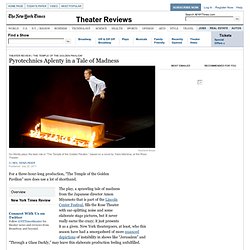
The play, a sprawling tale of madness from the Japanese director Amon Miyamoto that is part of the , fills the Rose Theater with ear-splitting noise and some elaborate stage pictures, but it never really earns the crazy; it just presents it as a given. New York theatergoers, at least, who this season have had a smorgasbord of more nuanced depictions of instability in shows like “Jerusalem” and “Through a Glass Darkly,” may leave this elaborate production feeling unfulfilled.
The play, written by Mr. Rereading: The Sea of Fertility tetralogy by Yukio Mishima. "Human life is limited but I would like to live forever.

" So Yukio Mishima wrote on the morning of 25 November 1970. By noon, he was dead: eviscerated and decapitated, by his own choice if not entirely his own hand. Flanked by young adherents, he had penetrated the Tokyo headquarters of Japan's Eastern Army, made a wild and whirling speech exhorting the troops to impose martial law in the emperor's name, and then performed ritual seppuku. Mishima was Japan's most famous writer, but henceforth nothing would define his life quite so much as the leaving of it. Before quitting his opulent home that November day, Mishima sealed and posted to his publisher the manuscript of The Sea of Fertility, a tetralogy of novels over which he had laboured for five years. Evaluations of Mishima have long been clouded by ambiguities: he was an inwardly divided man who divided public opinion accordingly. Vs 東大全共闘 Mishima speech (with English Subs) Yukio Mishima....Rare 1969 Interview In English The Lady Aoi YUKIO MISHIMA- "YUKOKU" with original score by Aaron Embry.
YUKIO MISHIMA- "YUKOKU" with original score by Aaron Embry. YUKOKU" by Yukio Mishima Pt.1 of 3- Original Score by Aaron Embry Yukio Mishima. Yukio Mishima (三島 由紀夫, Mishima Yukio?)
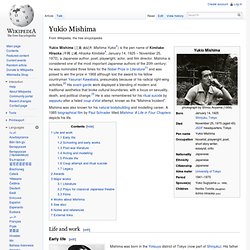
Is the pen name of Kimitake Hiraoka (平岡 公威, Hiraoka Kimitake? , January 14, 1925 – November 25, 1970), a Japanese author, poet, playwright, actor, and film director. Mishima is considered one of the most important Japanese authors of the 20th century; he was nominated three times for the Nobel Prize in Literature[1] and was poised to win the prize in 1968 although lost the award to his fellow countryman Yasunari Kawabata, presumably because of his radical right-wing activities.[2] His avant-garde work displayed a blending of modern and traditional aesthetics that broke cultural boundaries, with a focus on sexuality, death, and political change.[3] He is also remembered for his ritual suicide by seppuku after a failed coup d'état attempt, known as the "Mishima Incident".
Mishima was also known for his natural bodybuilding and modelling career. A 1985 biographical film by Paul Schrader titled Mishima: A Life in Four Chapters depicts his life. Faubion Bowers. Faubion Bowers (29 January 1917 – 17 November 1999) was a noted academic and writer in the area of Asian Studies, especially Japanese theatre.
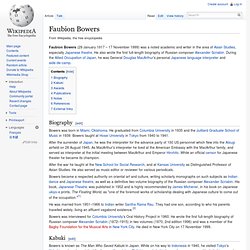
He also wrote the first full-length biography of Russian composer Alexander Scriabin. During the Allied Occupation of Japan, he was General Douglas MacArthur's personal Japanese language interpreter and aide-de-camp. Biography[edit] Bowers was born in Miami, Oklahoma. He graduated from Columbia University in 1935 and the Juilliard Graduate School of Music in 1939. After the surrender of Japan, he was the interpreter for the advance party of 150 US personnel which flew into the Atsugi airfield on 28 August 1945.
After the war he taught at the New School for Social Research, and at Kansas University as Distinguished Professor of Asian Studies. He was married from 1951–1966 to Indian writer Santha Rama Rau. Bowers was interviewed for Columbia University's Oral History Project in 1960. Kabuki[edit]